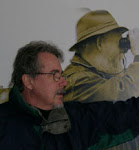Are you looking for a film school that you can afford?
It's a click away.
[Note: Sometimes you may need to click on this link more than once, but don't give up. The site is well worth your investigation.]
The "MakingOf" website is constructed and maintained by Christine Aylward and was begun with her friend Natalie Portman.
The "MakingOf" website is constructed and maintained by Christine Aylward and was begun with her friend Natalie Portman.
Above is a sampler from an interview with the Oscar and Emmy award winning screenwriter Aaron Sorkin, which I am using for a course that I am developing for Brandman University-- ENGU 348: Writing and Producing for New Media in the 21st Century."
Below is another interview from the rookie screenwriters of the hit film "500 Days of Summer" Scott Neustadtler and Michael Weber.
[Note: Sometimes you may need to click on these links more than once, but don't give up. The site is well worth your investigation.]
Another good YouTube film resource is DP/30
http://www.youtube.com/user/TheHotButton/videos?view=1&flow=grid






